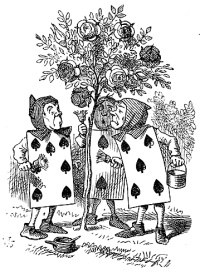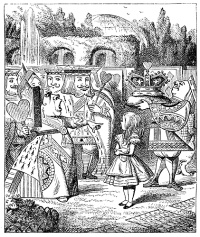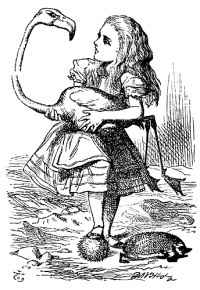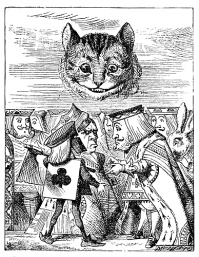The Queen's Croquet-Ground
Studies in Alice VIII, by Marc Edmund JonesThis lesson considers the eighth chapter of Alice in Wonderland and the eighth great principle of wisdom in the Philosophy of Concepts as revealed through the adventure of Alice is that the stage is created by the star or man is the focus of his circumstances. This is thoroughly recognized as cardinal doctrine in New Thought or modern metaphysics as on the one hand to be taken wholly for granted by the devotees of that field and on the other to be completely ignored as a mental fad or bit of cult foolishness. In the approach to an understanding of life through the organization of a system of concepts the extremes in either direction must be avoided. Man grows into control of his environment not by mental realization of his ability to do so but by a gradual and often temporarily unsuccessful implanting of his influence or extension of his essence of self into each individual detail of his surroundings. An illustration of this is found in an encounter of a skilled mechanic with a bit of refractory machinery. He frequently will make a needed adjustment in a part that he has gone over a number of times without success and wonder how he missed it. To ignore the prominent role that consciousness plays in all relations between animate and inanimate things, as marked in any control of circumstances, is to turn to the rationalistic extreme in the explanation of life. In this theory the cosmos is mechanistic throughout and man as a spiritual entity is lost. He becomes the machine and the phenomena that mark his divinity are either forced sidewise into the theory or denied.
Here is the principle of intelligence. Conception or
knowing is not the acquisition of precepts or the
memorizing of the body or substance of the particular
knowledge. It is a process of centering through which
facts are  related in essence to self. Thus knowledge
without intelligence or outer form is dangerous, whereas
intelligence without knowledge or inner relationship is
almost an anomaly since intelligence can always gain
and even create its knowledge. Achievement rather
than experience is the justification for living because
achievement demands intelligence as latent if not
consciously acting while experience merely leads to
knowledge. The symbolism of the eighth chapter of
Alice is therefore interesting in showing how outer
things assemble in representation of the inner reality.
The painting of the roses with which the chapter opens
is that poignant note first struck by Shakespeare's "paint
the lily" (King John IV, ii, 11). It shows the attempt by
man to control his circumstances and it dominates his
inherent realization that to do so is possible. All the
characters here except the few previously introduced are
playing cards and the remarkable feature of both the
familiar fifty-two card deck and the Tarot is the manner in which they may be used by skillful
operators in the divination of any condition of affairs thanks to their readiness in assembling to
represent this or that state of consciousness. If man may use or subject to his will such agency
as playing cards, to represent the condition in consciousness of the circumstances around him,
obviously this manipulation of the representative medium proves the possibility of manipulation
of the represented circumstances by showing the reality to lie in the consciousness. If the reality
were in the object it would be in the cards as objects of manipulation and they could not be used
to represent something other than themselves. Indeed, true divination is but objectification and
divination as seen conventionally in ordinary or everyday judgment is the only outer proof of
intelligence aside from the eventual fruits of action.
related in essence to self. Thus knowledge
without intelligence or outer form is dangerous, whereas
intelligence without knowledge or inner relationship is
almost an anomaly since intelligence can always gain
and even create its knowledge. Achievement rather
than experience is the justification for living because
achievement demands intelligence as latent if not
consciously acting while experience merely leads to
knowledge. The symbolism of the eighth chapter of
Alice is therefore interesting in showing how outer
things assemble in representation of the inner reality.
The painting of the roses with which the chapter opens
is that poignant note first struck by Shakespeare's "paint
the lily" (King John IV, ii, 11). It shows the attempt by
man to control his circumstances and it dominates his
inherent realization that to do so is possible. All the
characters here except the few previously introduced are
playing cards and the remarkable feature of both the
familiar fifty-two card deck and the Tarot is the manner in which they may be used by skillful
operators in the divination of any condition of affairs thanks to their readiness in assembling to
represent this or that state of consciousness. If man may use or subject to his will such agency
as playing cards, to represent the condition in consciousness of the circumstances around him,
obviously this manipulation of the representative medium proves the possibility of manipulation
of the represented circumstances by showing the reality to lie in the consciousness. If the reality
were in the object it would be in the cards as objects of manipulation and they could not be used
to represent something other than themselves. Indeed, true divination is but objectification and
divination as seen conventionally in ordinary or everyday judgment is the only outer proof of
intelligence aside from the eventual fruits of action.
 The achievement of imagination in the
chapter, or the eighth great scientific
anticipation, is the revelation of the
principles of relativity as given to the
modern world by Albert Einstein. These
principles are but little known to the layman
yet their general acceptance today marks the
greatest single step of scientific advancement
during the first quarter of the twentieth
century. Perhaps the best illustration of
relativity is gained by going back two
centuries in the growth of modern science to
a somewhat parallel case. When the earth
was regarded as the center of the solar
system the doctrine of epicycles was used to
account for the retrograde motions of the
planets, meaning that each planet in addition
to circling around the earth was supposed to
go around a little circle in its own orbit. At
last Tycho Brahe discovered an error of eight
minutes in the movement of Mars for which
no possible modification of the epicycle theory could account. Therefore, as Kepler remarked,
on these eight minutes of Mars a new theory was built out of necessity and man gained a
heliocentric system scientifically. When Leverrier in recent times discovered that the orbit of
Mercury was rotating in its own plane forty-three seconds a century it was seen that the accepted
helio-centric theory must be discarded because an intra-Mercurial planet, to have bulk sufficient
to account for this influence on Mercury, would be more than large enough to influence other
planets and this influence does not exist. Immediately effort was made to measure the motion of
the solar system in space or in an ether drift with the idea of building a theory of planetary
motion on absolute motion of the whole system. It was discovered at once that nature seemed
almost in conspiracy to prevent this measurement, but to Albert Einstein first came the thought
that perhaps this was a law rather than a conspiracy as it was of necessity impossible to
determine absolute motion by an experiment whatever. Thus science at last embraced the
occult. Everything was seen to be relative to the absolute sphere of direct activity. Space and
time became identical as space-time. Force became no more than acceleration. Straight lines
ceased to be, and so on.
The achievement of imagination in the
chapter, or the eighth great scientific
anticipation, is the revelation of the
principles of relativity as given to the
modern world by Albert Einstein. These
principles are but little known to the layman
yet their general acceptance today marks the
greatest single step of scientific advancement
during the first quarter of the twentieth
century. Perhaps the best illustration of
relativity is gained by going back two
centuries in the growth of modern science to
a somewhat parallel case. When the earth
was regarded as the center of the solar
system the doctrine of epicycles was used to
account for the retrograde motions of the
planets, meaning that each planet in addition
to circling around the earth was supposed to
go around a little circle in its own orbit. At
last Tycho Brahe discovered an error of eight
minutes in the movement of Mars for which
no possible modification of the epicycle theory could account. Therefore, as Kepler remarked,
on these eight minutes of Mars a new theory was built out of necessity and man gained a
heliocentric system scientifically. When Leverrier in recent times discovered that the orbit of
Mercury was rotating in its own plane forty-three seconds a century it was seen that the accepted
helio-centric theory must be discarded because an intra-Mercurial planet, to have bulk sufficient
to account for this influence on Mercury, would be more than large enough to influence other
planets and this influence does not exist. Immediately effort was made to measure the motion of
the solar system in space or in an ether drift with the idea of building a theory of planetary
motion on absolute motion of the whole system. It was discovered at once that nature seemed
almost in conspiracy to prevent this measurement, but to Albert Einstein first came the thought
that perhaps this was a law rather than a conspiracy as it was of necessity impossible to
determine absolute motion by an experiment whatever. Thus science at last embraced the
occult. Everything was seen to be relative to the absolute sphere of direct activity. Space and
time became identical as space-time. Force became no more than acceleration. Straight lines
ceased to be, and so on.
 The symbolism of the croquet game is not remarkable as a
feat of imagination because it is very good dream stuff
and the stuff of dreams has eternally demonstrated these
principles, but it is striking in the rigid cleavage that it
shows to relativity. The flamingo mallets could not be
detached from attention to the self that held them. The
hedgehog balls would not remain the bristly globes they
were supposed to be but functioned correctly for globes in
whole accordance with their own desires. The soldier
arches were just as unstable. The game is an allegory of
life. With the bird or aspiration, the hedgehog or
centralized being is to be driven through the soldier or
law.
The symbolism of the croquet game is not remarkable as a
feat of imagination because it is very good dream stuff
and the stuff of dreams has eternally demonstrated these
principles, but it is striking in the rigid cleavage that it
shows to relativity. The flamingo mallets could not be
detached from attention to the self that held them. The
hedgehog balls would not remain the bristly globes they
were supposed to be but functioned correctly for globes in
whole accordance with their own desires. The soldier
arches were just as unstable. The game is an allegory of
life. With the bird or aspiration, the hedgehog or
centralized being is to be driven through the soldier or
law.
The law of applied psychology or the eighth big idea for the solution of personal problems is brought out here in the technique of discipline. "Off with his head" says the queen, who represents life, for man ordinarily always seeks to destroy whatever annoys him. But there are sources superior to outer existence that are the basis of real poise. This is self-discipline as opposed to the discipline on the self from without and Alice recognizes these characters in their true nature as cards and is able to defy them.
 We see her most interestingly communing with her
higher self or the cat that cannot be beheaded. No
injury or accident to man can reach his soul or real
being. The student must learn to TALK ABOUT
IT and bring out and present the circumstances of
life for mastery. Silence is the rule for the within,
as communion or talk with the inner self, but
conversation as expression and committal of the
self is social contact and it remains eternally the
rule for the without.
We see her most interestingly communing with her
higher self or the cat that cannot be beheaded. No
injury or accident to man can reach his soul or real
being. The student must learn to TALK ABOUT
IT and bring out and present the circumstances of
life for mastery. Silence is the rule for the within,
as communion or talk with the inner self, but
conversation as expression and committal of the
self is social contact and it remains eternally the
rule for the without.

Sabian.org





